PEDAGOGICAL UNIVERSITY IN CRACOW
INSTITUTE OF SPECIAL NEEDS EDUCATION
invites to participate
in
International Scientific Conference
BREAKING BARRIERS TO INCLUSION
Implementation of Universal Design for LEARNING at schools
Cracow, Poland / on-line
18 – 19 May 2021
The honorary patronage of the event was taken
by JM Rector Prof. Dr. Piotr Borek
About the project
The Universities Teams
Vitautas Magnus University
in Kaunas
Academy of Education
in Vilnius, Lithuania
About VMU
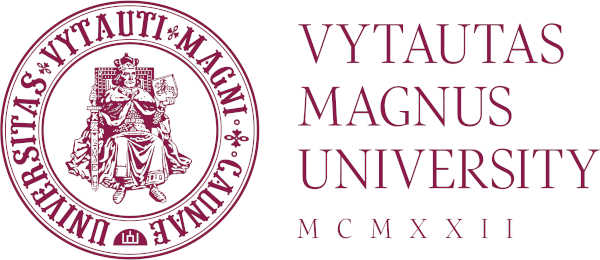
Visit https://www.vdu.lt/en/about-vmu for more information.
Vytautas Magnus University is a comprehensive university devoted to excellence in teaching, learning, research, arts and innovation, and fostering critical thinking, imaginative response as well as the desire and capacity for lifelong learning of the students who will have an impact on the world, locally and globally.
VMU has a reputation as a university with a globally oriented, free-spirited, liberal mindset. Studying at VMU means obtaining an all-round education conveying core competencies and abilities such as a broader understanding of global issues and society, the capacity for problem analysis and critical thinking, a spirit of inquisitiveness enabling one to adapt to new knowledge and promoting an attitude of lifelong learning, all of which empower one to make informed judgements as an individual and act confidently as a leader.
Many of the research innovations at VMU are born at the confluence of disciplines. VMU is currently conducting about 100 projects in the fields of biotechnology, biophysics, technology law, education, sociology, philosophy, computational linguistics, language acquisition and bilingualism, creative industries, and others.
VMU works with many universities and scientists around the globe, implementing projects, student and employee exchanges, and improving our study and research system. It is an international and multilingual institution that continuously develops international networks and intercultural dialogues, participates in international scientific, academic and social projects, encourages lecturer and student mobility, and promotes dialogue and tolerance.
VMU offers enjoyable environment for studies at all levels of university education as students arrange their schedule for the lectures (the study plan) according to the requirements of the chosen study programme and their own intentions.
University of Vienna
The Centre for Teacher Education, Vienna, Austria
Center for Teacher Education, University of Vienna

Visit https://lehrerinnenbildung.univie.ac.at/en/about-us for more information.
The Centre for Teacher Education (ZLB) at the University of Vienna comprises different subunits concerning research, studies and teaching as well as service and counselling. Developing and sustaining a functioning network between the individual subject didactic centres and promoting their professional exchange and collaboration represent central activities.
The centre - in cooperation with the University College of Teacher Education in Vienna and Lower Austria, the University College of Teacher Education of Christian Churches Vienna/Krems, the University College for Agrarian and Environmental Pedagogy- is part of the North-East Schools’ Group of a joint teacher education programme at secondary level. The group has been implemented in 2016 and offers 27 teaching subjects and one specialization in Inclusive Education to choose from. Collaboration with 70 schools ensures varied and high quality practice experience.
Pedagogical University
in Cracow
Institute of Special Needs Education, Cracow, Poland
More informationThe Schools Teams
Schulzentrum Donaustadt, Vienna, Austria
Schulzentrum Donaustadt, Vienna, Austria
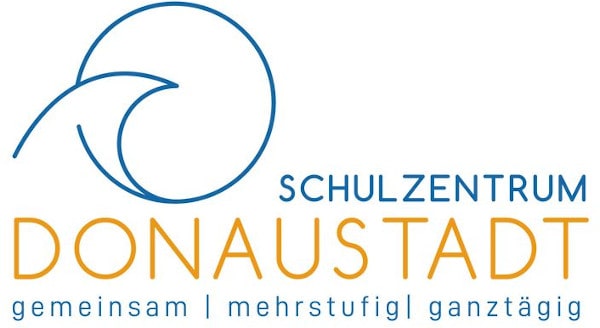
Visit https://schulzentrum22.schule.wien.at for more information.
Schulzentrum Donaustadt (former Lernwerkstatt Donaustadt) is an inclusive school on the outskirts of Vienna. The focus is on teaching children of all abilities together. Lessons alternate between bound and open teaching methods. Our goal is to make children independent and fit for their next step into the future. We focus on self-reflection, planning, research and self-determined learning.
Vilnius Balsiai Basic School, Lithuania
Vilnius Balsiai Basic School, Lithuania
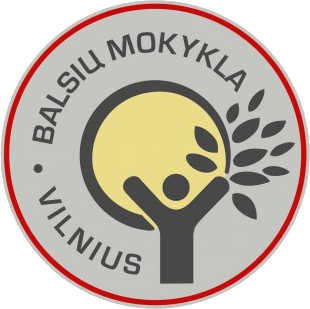
Visit http://www.balsiumokykla.lt for more information.
Vilnius Balsiai Progymnasium is very young, established in 2011. This is the first school built in the capital city after the restoration of independence of the State of Lithuania. Moreover, in 2020 the new branch of the expanded institution was built. Therefore, we are going to celebrate the 10th anniversary of still increasing school in September, 2021.
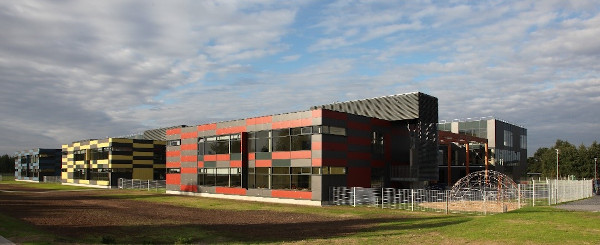
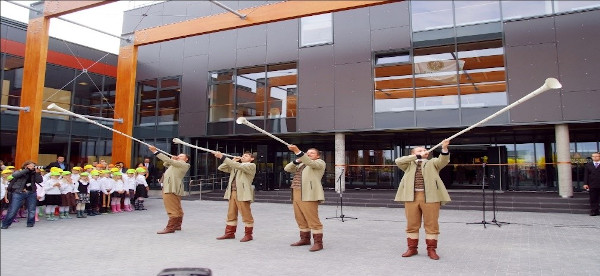
Both school buildings are brand new, modern, comfortable, equipped with modern technologies and tools. They serve as a work and activity place for 1240 students. There are 632 students, 26 classes in primary education program (1–4 grades), 608 students, and 23 classes in lower secondary education program (5–8 grades). We have 71 pupils with special educational needs: 19 of them having severe and 45 students with mild disorders, as well as 7 pupils with low educational needs. All the students with special educational needs are taught in mainstream classes.
Eighty-three teachers work at our school, following formal and informal programs. Also, we have nine support professionals who take care of students with special needs and help with learning or behaviour problems. In our classes, 12 teacher assistants assist teachers and help them to deal with problems in the classroom.
The school is managed by the administrative team, i.e. the headmaster and 4 deputies, moreover, 4 persons work in the office and libraries. The team of school administration collaborates with the School board – the main community institution.
51 informal clubs and studios work at school after lessons for developing different competences and personal skills of students. Some of them offer ethno-cultural activities – exclusiveness of our school. 23 clubs and studios are supported by the government funds and 31 paid by the parents of the students.
Vilnius Balsiai Progymnasium is situated in a very beautiful place surrounded by the territories of the Green Lakes and Verkiai Regional Park. By exploring these territories, the curriculum has been enriched with attractive forms of education. The school encourages the organizing of contextual lessons and the development of outdoor learning strategies. One of our successes is the organization of integrated educational activities in outdoor spaces. By performing individual and team tasks in other educational environments and reflecting on their activities, students have the opportunity to apply practical and theoretical knowledge, get to know, discover, research, make decisions, experiment, observe and develop general competencies. Cross-learning strategies improve learning outcomes, individual student progress, and overall progress of school.
The priority of the school’s activities is improvement of microclimate and strengthening of independent (conscious) learning, therefore the school participates in various projects that correspond to implementation of the school’s priorities. One of the important projects for our school is “Preconditions of Transformation of Education Process in Different Educational Contexts by Applying Inclusive Education Strategies”. We are very pleased that teachers have the opportunity to gain international experience through an inclusive education methodology that has an impact on improving students’ achievement and overall school progress.
Currently, in the process of distance learning, the school is actively developing virtual cognition by applying various digital technologies in the educational process. Remote learning has confirmed that the Balsiai Progymnasium is always open to change, its teachers are focused and willing to learn.
Tähtikunnan koulu, Sodankylä, Finland
Tähtikunnan koulu, Sodankylä, Finland
Visit https://peda.net/sodankyla/koulujen-sivut/ukkll for more information.
Sodankylä is called ‘municipality of stars’. Our pupils have named the school after that in a name competition that was held in 2019. The two local comprehensive schools, Aleksanteri Kenan koulu and Sompion koulu, were combined in the beginning of the year 2020. The school building will be ready for the school year 2022-2023. We do not have any logo yet in our school, so instead of that we show the construction stage of our school building at the moment.
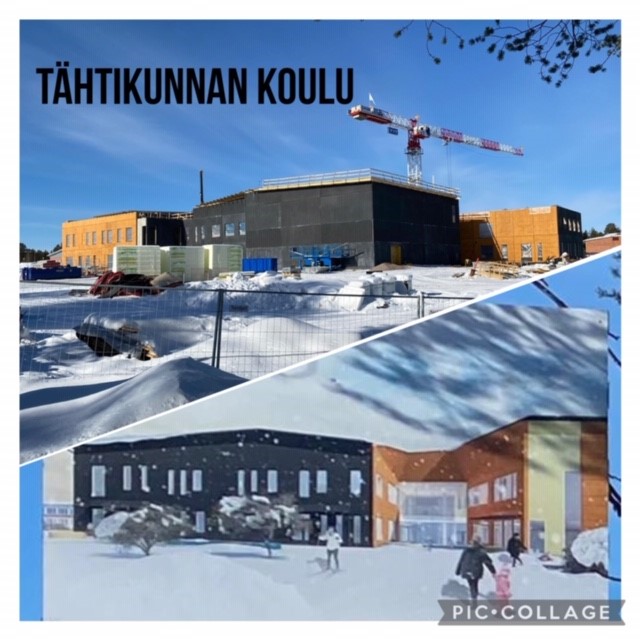
Tähtikunnan koulu is a single structure comprehensive school with 391 pupils in grades 0-6, 200 pupils in grades 7-9, one principal, two vice principals, 61 teachers and around 30 members of staff.
Our teachers are excited about their work and interested in developing our school as a community and a learning environment. We work together to reach our goals and our cooperation is seamless. While the youngest of our pupils are learning how to read and write, the older ones are taking their first steps towards adult life. Working with different age groups is a source of constant joy for the staff.
Our special education groups are for every pupil in the municipality who has more demanding special education needs. We have also developed inclusive education, UDL and co-teaching in our school. The inclusion and co-teaching come true also in our secondary school level.
The pupils with immigrant background in Sodankylä are taught in our school, and it is no wonder our pupils grow up to be tolerant and emphatic towards fellow men. Of course, no school is without problems, and if they arise, we face them together. Our goal is to raise well-behaved young adults, who have the skills and knowledge they need to achieve their goals after comprehensive school.
Tähtikunnan koulu is a UN school, which means that our school supports the United Nation’s work and we work together to build a sustainable future. Our status as a UN school can be seen in our daily life as different theme days and collective projects. We also belong to Majakka (Fyren, Lighthouse), the school improvement network, led by Finnish National Agency for Education.
Centre of Schools
No. 9, Cracow, Poland
Centre of Schools no. 9, Cracow, Poland
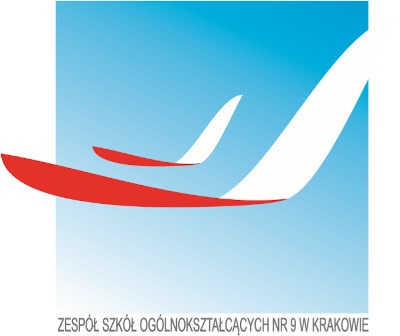
Visit https://zso9.krakow.pl for more information.
Our organization consists of Primary School No. 128 and XXIII Secondary School. The institution is in its entirety an integration school that has students with special needs at every level. In recent years, the spectrum of autism, including Asperger's syndrome, has dominated among students with special educational needs. In addition, our school also educates children with aphasia, hearing impaired, mobility disabled and others.
The number of students in the integration class is from 15 to 20, including from 3 to 5 students with special educational needs. The same curriculum applies for all classes and all students use the same textbooks.
In primary school there are two teachers present at the lessons - a teacher of the initial or a given subject and a support teacher with qualifications in the field of special education. Moreover, we provide our students with specialist revalidation classes recommended in judgments and opinions by psychological and pedagogical counseling centers. Our teachers' work is supported by: psychologists, educators, teachers of the deaf and speech therapists. EEG Biofeedback trainings are conducted free of charge at the school. Classes are designed to support the educational, social and emotional development of the student.
In our secondary school, we have been educating young people in the field of aviation for several years. The aviation class is very popular among candidates because it offers theoretical classes in aviation knowledge, aviation English as well as selected practical classes, such as a parachute course or a gliding course. Extensive cooperation with institutions related to aviation (clubs, bases, airports, etc.) enables attractive classes and professional knowledge.
Our school building is spacious and big enough to host students of different age in comfortable environment. The school is well supplied with modern multimedia equipment with a broadband connection in each classroom. The teachers are fully-qualified and constantly acquire new skills and qualifications on postgraduate courses. They are willing to learn new teaching methods, especially while teaching students with the ASD, sharing experience in that field with others.
Understanding the tasks of modern education, our teachers think that modern teaching must change with the changing environment, meet the expectations of students and their parents, open doors to future careers for young people and help them realize their personal life plans and dreams. The teachers in our school believe that a teacher should set an example of an open-minded person who constantly looks for the ways of self-development and seek the opportunities offered by modern world.
O nas
asd
Conference Programme
18 MAY - TUESDAY
Chairs: dr hab., prof. UP. Jolanta Baran, dr hab., prof. UP. Tamara Cierpiałowska, dr Ewa Dyduch
15.00 – 15.15
Opening and welcoming
15.15 - 15.35
Prof. Kas Mazurek, Prof. Margret A. Winzer, University of Lethbridge, Faculty of Education, Alberta, Kanada
Retrospect, promises, prospects: A comparative study across time and space in inclusive schooling
15.35 - 15.55
Prof. zw. dr hab. Marzenna Zaorska, University of Warmia and Mazury, Faculty of Social Sciences, Olsztyn, Poland
The Concept/model of education for all in Poland (theoretical assumptions and proposed implementation solutions)
15.55 - 16.15
Dr hab. prof. UZ Zdzisława Janiszewska-Nieścioruk, University of Zielona Góra , Faculty of Social Sciences. Zielona Góra, Poland
The problematic issues of educational inclusion of students with disabilities in Poland
16.15 - 16.35
Prof. Dr. Alvyra Galkiene, Vytautas Magnus University, Academy of Education Kaunas-Vilnius, Lithuania
Effective learning without barriers
16.35 - 17.00
Discussion
17.00 - 17.10
Break
Chairs: dr hab., prof. UP. Jolanta Baran, dr hab., prof. UP. Tamara Cierpiałowska, dr Ewa Dyduch
17.10 - 17.30
Adj. Prof. Suvi Lakkala, Dr. Outi Kyrö-Ämmälä, University of Lapland, Faculty of Education, Rovaniemi, Finland
Teaching for Diversity with UDL: Analysing Teacher Competence
17.30 - 17.50
Assoc. Prof. Michelle Proyer, Dr. Gertraud Kremsner, University of Vienna, Center for Teacher Education, Austria
Re - assessing and sustaining inclusive instruction – Localized perspectives on UDL
17.50 - 18.10
Assoc. Prof. Julita Navaitienė, Assoc. Prof. Eglė Stasiūnaitienė, Vytautas Magnus University, Academy of Education, Kaunas-Vilnius, Lithuania
UDL in Action: Breaking Barriers to Development of Motivated and Purposeful Learners
18.10 - 18.30
Dr. Irja-Kaisa Lakkala, MEd. Päivi Neitola, MEd. Auli Näsi, szkoła: Tähtikunnan koulu, Sodankylä, Finland
We will go over this together - UDL concretenes s in ordinary life in our school
18.30 – 19.00
Discussion
19.00 – 19.15
Summary of the 1st day of the conference
19 MAY - TUESDAY
Chairs: dr hab., prof. UP. Jolanta Baran, dr hab., prof. UP. Tamara Cierpiałowska, dr Ewa Dyduch
15.00 - 15.10
Welcoming Participants on the 2nd Day of the Conference
15.10 - 15.30
Prof. zw. dr hab. Zenon Gajdzica, University of Silesia, Faculty of Social Sciences, Katowice, Poland
Good inclusive education practices – selected examples of non - systemic solutions
15.30 - 15.50
Prof. Dr. Ona Monkevičienė, Prof. Dr. Alvyra Galkienė, Vytautas Magnus University, Academy of Education, Kaunas-Vilnius, Lithuania
Development of Knowledgeable and Resourceful Learner in the inclusive school context
15.50 - 16.10
Dr hab. prof. UTH Anna Zamkowska, University of Technology and Humanities, Faculty of Philosophy and Pedagogy, Radom, Poland
Teachers’ training for inclusive education in Poland - status and new challenges
16.10 – 16.30
As. Prof. Dr. Rasa Nedzinskaitė-Mačiūnienė, Gerda Šimienė, Vytautas Magnus University, Academy of Education, Kaunas-Vilnius, Lithuania
How Expectations Become a Reality: Developing a Strategic and Goal Directed Learner
16.30 – 17.00
Discussion
17.00 – 17.10
Break
Chairs: dr hab., prof. UP. Jolanta Baran, dr hab., prof. UP. Tamara Cierpiałowska, dr Ewa Dyduch
17.10 - 17.30
dr hab., prof. UP. Jolanta Baran, dr hab., prof. UP. Tamara Cierpiałowska, dr Ewa Dyduch Instytut Pedagogiki Specjalnej, Uniwersytet Pedagogiczny w Krakowie
Breaking barriers and mechanisms and factors for changing the teaching - learning process using the UDL approach – towards inclusive education
17.30 - 17.50
Katrin Krischke, Gudrun Messenböck, Beatrix Wagner, Gutscher Marion, szkoła: Schulzentrum Donaustadt, Austria
Children - experts of their own learning, research and reflection process - UDL based Lessons
17.50 - 18.10
Virginija Giršvildienė, Asta Antulienė, Giedrė Vaišnoraitė, szkoła: Vilnius Balsiai Basic School, Lithuania
Elements of success in English and Lithuanian lessons based on UDL
18.10 - 18.30
Anna Głogowska, Iwona Komenda, Beata Łukasik, szkoła: Zespół Szkół Ogólnokształcących nr 9 w Krakowie, Poland
How UDL changes the teaching -learning process during the lesson. About breaking barriers at our school
18.30 - 19.00
Discussion
19.00 – 19.15
Summary of the 2nd day and closing of the conference